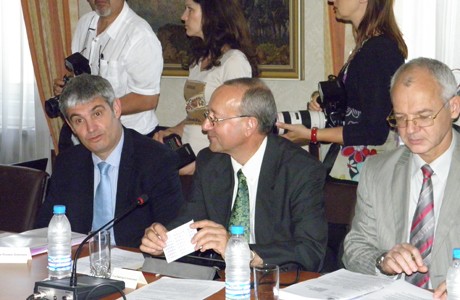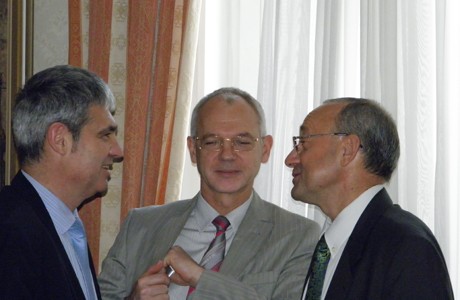Назад
Назад
“We want emphasis to be placed on support for companies so that they have more qualified and better trained employees, as
“We want emphasis to be placed on support for companies so that they have more qualified and better trained employees, as well as on lowering the age for entrepreneurship training and increasing the hours of training in those skills”, the President of BCCI said in his speech during the session of the Economic Development and Social Policy Council.
The proposals included in the position-paper of the Economic Development and Social Policy Council entitled “Inclusive growth – employment and social inclusion” outline the areas of impact which to a large extent coincide with the National Development Programme, and some of them concur with the guidelines adopted by the General Assembly of the Bulgarian Chamber of Commerce and Industry (BCCI).
BCCI supports the following ideas expressed in the document:
Support for Bulgarian enterprises so that they have more opportunities to organize training /qualification/ and retraining of their workers and employees. Specifically, we would like to see lowering the age for entrepreneurship training and increasing the hours for training in those skills.
Suitable conditions must be created for easy access to the market and starting own business as a means of promoting youth employment. We fully support the integration of the most vulnerable part of the labour market, with emphasis on young people, by improving their suitability for work, including by creating new jobs for young people, helping them acquire skills in real working environment (through internships and apprenticeships), providing extensive training for acquisition of key competencies, making coordinated efforts for improvement of their literacy and acquisition of skills and professional qualifications adequately reflecting the labour market’s demands, providing high-quality intermediation services on the labour market, etc.
We would like the gap between the quality of education in elite schools and other schools to be bridged. We, as well as other employers, have met candidates with secondary education diplomas that have studied foreign languages for 5 years but still cannot speak properly. The teachers that have produced such workers do not deserve half of their salaries. The state assessment is a great way to see what results have been achieved.
Some of the proposed measures for achieving these goals, however, do not coincide with the expectations of the members of the BCCI, especially in the following areas:
They do not create a level playing field for companies (e.g. “Investment in human resources in highly productive, high tech and innovative enterprises which have the potential to create high added value. High technologies can be used by well-qualified labour force, and innovation can be created and implemented by employees that have the respective knowledge and skills. Direct support for employers to create jobs in those sectors and in the “green economy” is a priority.)
Even though the proposal is good, the question remains what the other companies would do. Therefore, we would like projects for financing innovation in specific companies to be evaluated, and not the subjective discretion of someone to serve as grounds for determining what is innovative. This raises another question – is it innovative on a regional, European or global level.
They are only exhortatory in character (e.g.: “Support for SMEs and entrepreneurship. This includes opportunities for access to investment in human resources, as well as support for introducing a flexible and more productive organization of the work process. Support for entrepreneurship and starting own business is an important prerequisite for promoting youth employment.”)
Let us allow SMEs to take part in public procurements, including by promoting and partially funding the establishment of clusters.
We would like employers not to be made to pay twice for something which the administration should do anyway and for which means are allocated in the state budget (e.g. “Investing in the capacity of public employment agencies in three directions:
- Providing more information and “taking better care” of job seekers and businesses;
- Diversification of services provided to job seekers and improving their quality. In particular, motivational training, psychological support, career counseling, etc.;
- The most important thing is to make employment agencies a place which is preferred by employees looking for another job, which would help them reach higher stages in their professional development; Better predicting the business’s needs in terms of labour force with specific qualification and skills. This should be done with the participation of the business itself, to help determine the module within which investments in the skills and knowledge of the workforce should be made.”)
“I believe that we are close to reaching a consensus on those issues”, the President of BCCI concluded.
“My firm belief is that without economic development it is difficult to talk about any other development of a nation or a country”, the President of the Republic of Bulgaria Rosen Plevneliev said during the session of the Economic Development and Social Policy Council on theme “Inclusive growth – employment and social inclusion”. “For 4 years now, Europe obviously cannot recover from the economic crisis which started in 2008. There are no such perspectives in the short term. This motivates us to behave responsibly, to make important decisions knowing that growth cannon be achieved in a day”, the Head of State said. According to him, for Europe to have significant growth, it should create potential for growth first. Growth potential is created with decisions of the Government, reforms and the efforts of many institutions with the correct support mechanism”, President Plevneliev added.
14.06.2012
Още новини:
-
08-06-2012

 1 USD =
1 USD =  1 GBP =
1 GBP =  1 CHF =
1 CHF =  ISO 9001:2015
ISO 9001:2015































